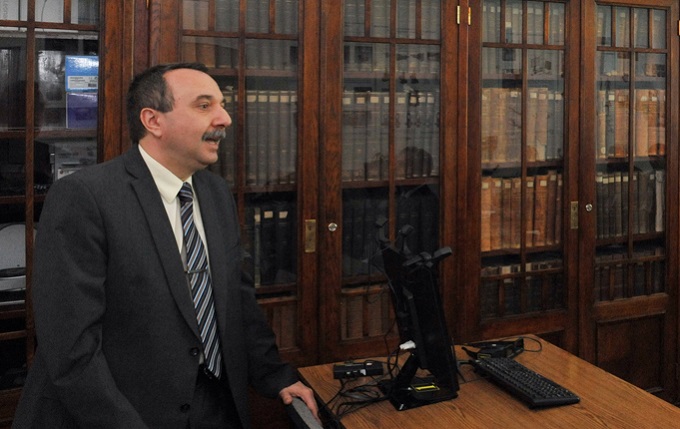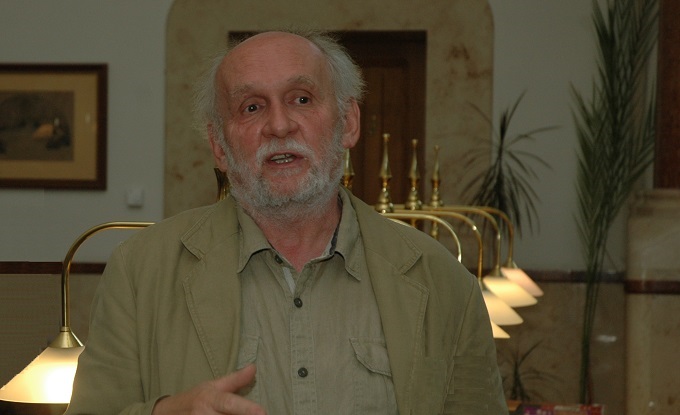News feed
BME has the most Journals with Impact Factor among Hungarian Universities
2014. 09. 19.The expert team managing the modernisation process of Periodica Polytechnica reported about the history and future plans of the journal.
As a result of overall structural decisions the Journal covering the seven scientific series of the University of Technology and Economics has been renewed this year. Modernising process of Periodica Polytechnica is supervised on the Rector’s commission by Tibor Czigány, Dean of Faculty of Mechanical Engineering (GPK) and the aim is to raise the journal’s quality standards to the international scientific levels. Rector Gábor Péceli appointed István Kollár, Professor of Department of Measurement and Information Systems of BME Faculty of Electrical Engineering and Informatics as the General Editor of the Journal from January 2014. Publication issues of the series are continually coordinated by Béla Liszkay, Director General of the National Technical Information Centre and Library.
As it is widely known the seven series of Periodica Polytechnica are related to the seven faculties (Chemical Engineering, Civil Engineering, Electrical Engineering and Computer Science, Mechanical Engineering, Social and Management Sciences, Transportation Engineering, Architecture) of the University of Technology and Economics. The first series were founded in 1957, the youngest one is the Social and Management Sciences published since 1993.
There have been several changes made during the over 50 years’ history of the Journal. For almost 30 years publications were issued in various - English, French, German, Russian - languages. Since the middle of the 80’s de facto official language has become English, therefore Periodica Polytechnica publishes only in English language. At the beginning the series were published by Akadémiai Kiadó in only 1000-1200 copies. The publications were not intended to make any profit; they were used in the publication exchange scheme with foreign libraries.
„In the autumn of 2012 the Board Meeting reviewed the situation of Periodica Polytechnica Journal and decided to address the backlogs for several years and also to introduce it in international scientific life. Some good examples for this process are the Civil Engineering, Chemical Engineering and Express Polymer Letters Journals the latter published by the Department of Polymer Engineering,” as Tibor Czigány summarized the events leading to recent developments.

István Kollár debuted as editor of the Electrical Engineering series of Periodica Polytechnica in 1988 and in 1991 he became the General Editor of the complete series of journals. He initiated another significant reform in the 1980’s, which was introducing the cost-effective LaTeX computer programme replacing the traditional mechanical typesetting. The system was used up to 2013, at present Adobe InDesign software is used for pagination of six series from the total of seven.
|
István Kollár is a professor at the Department of Measurement and Instrument Engineering of the Budapest University of Technology and Economics. After graduation in 1977 as an electrical engineer he started his career at the same department. He became a Candidate of Science in 1985 and Doctor of the Academy Degree in 1997. In 1989-90 he was a visiting professor at the Vrije Universiteit Brussel, Belgium and in 1993-95 he spent two years as a Fulbright scholar and visiting associate professor at Stanford University, California, USA. Between 1997 and 2000 he received the Széchenyi scholarship for Hungarian professors. István Kollár has been playing an active role in the Doctoral Council of Electrical Engineering, at present he is the leader of the doctoral school. Between 1997 and 2004 he was the Vice Dean for the Development of Education at the Faculty of Electrical Engineering and Informatics; he initiated developing the Publication Database of BME. In 1997 the Institute of Electrical and Electronics Engineers in the USA elected him as „fellow”. Between 1997 and 2000 and also 2003 and 2006 he was the only elected Central European member of the IEEE Instrumentation and Measurement Society Administrative Committee. |
István Kollár resigned from his general editor position after gaining a scholarship in the USA. “I persuaded my colleague and friend, Ferenc Wettl to undertake the task,” he remembers. “During his 20 years of activity as the general editor Ferenc Wettl established and launched the electronic version of the Periodica Polytechnica (www.pp.bme.hu) and another great achievement of his was to introduce an electronic journal-editing method, the Open Journal System,” adds Béla Liszkay, Director General of the National Technical Information Centre and Library. He also informed us that publishing the series has been the Library’s responsibility since 2000 but these days printed versions of the journal are becoming less and less popular. “At present 20 copies are published from each issue, the exceptions are the Architecture with over 100 copies and the printed copies that are to be sent to the University’s international partners to maintain exchange partnership,” says Béla Liszkay. The BME National Technical Information Centre and Library besides its regular duties (coordinating the editorial staff, organizing technical aspects of electronic publication, publishing printed copies) contributed to the establishment of the online archives in which all the previous issues can be searched online.

“Periodica Polytechnica is the main publication surface for PhD students and professors of the University but if we wish to make it a high-quality journal we have to attract foreign authors as well,” says the General Editor regarding the future plans. He also adds that he found it very annoying in the past that articles were accepted only by the faculty leaders’ recommendations, without any independent professional evaluation. “In my opinion an outstanding scientific journal inevitably needs independent expert judgement of the articles.” István Kollár mentions as the primary aim to raise the quality of the series to international standards. “It should not only be a ‘homemade’ publication but become an academic journal with impact factor,” he emphasizes.
|
Scientific journals are measured by the number of citations (impact factor) to the articles published. Impact factors are calculated by Thomson Reuters (previously the Institute for Scientific Information, publisher of SCI); in any given year the impact factor of a journal is the average number of citations received per paper published in that journal during the two preceding years (the method was invented by Eugene Garfield). The database known as Web of Science (WoS) contains the information about the most frequently cited journals and also about the scientists referring to these journals. Today ISI follows over 9000 journals. |
Tibor Czigány speaks about future plans with great enthusiasm: “The first and most important measures have been taken in the past two years, there are no backlogs, the editorial boards have been set up and we have more and more foreign authors. The next two years will be the period of further development to ensure international standards and quality, independent, strict and up-to-date evaluation and judgement and accurate, spotless publication process. If all these aims are successfully achieved – and with the contribution of the old-new general editor and the professional staff of the library we have got great chances for that – articles will get more and more citations and in two years the series may apply for impact factor.”
At present two series of Periodica Polytechnica have impact factors: the journals of the Faculty of Civil Engineering and the Faculty of Chemical Engineering. “In order that all publications are to be examined several criteria must be met: evaluation and lecturing of articles, international editorial board, accurate timing of publication and citations,” emphasizes the General Editor. He also mentions that there is such a large number of journals that the process can hardly be managed by the lectors. “For scientific degrees it is required to publish certain numbers of publications on the other hand all scientists have their research areas to deal with therefore they have limited availability to judge and rate other scientists’ publications. It is important that articles should be evaluated by not only professors of the University but independent international experts; this has been achieved mostly by personal contacts,” clarifies the professor, who also receives a huge number of requests from abroad but undertakes lecturing one article per month.
With regards to the second criteria - timely publication of the journal - István Kollár mentions that “if we want to leave time for citations the first issue of 2015 must be published in December 2014. These days time factor is determined by the internet, therefore articles must be published in ‘online first’ version meaning that the article has been approved for publication, it has been edited and paginated but has not been edited in a given issue of the journal. This solution will raise the number of citations within a relatively short time period,” he adds. “If a series can easily be found and the articles are high-quality it would become a self-generating and strengthening process.” It is also important that articles’ contents must be interesting and attractive for the readers, who are mostly PhD students as they are obliged to research and publish. In order to raise the quality of the series foreign authors should be invited for contribution in Periodica Polytechnica. Unfortunately this is a vicious circle because “until we have an impact factor scientists are reluctant to publish in our journal but without that it is hard to produce the required citation number.”
“If Periodica Polytechnica is able to enter international scientific life,” says István Kollár “it would raise the prestige of BME in education and research as well. I trust that this aim can be achieved with hard work and persistence. This is why I decided to undertake the general editor position again,” emphasized the old-new General Editor of the journal. “The journal is published as it is required from a professional academic journal,” adds Béle Liszkay, leader of the Library.
- TJ,MA -
Photos: János Philip, Erik Pintér
